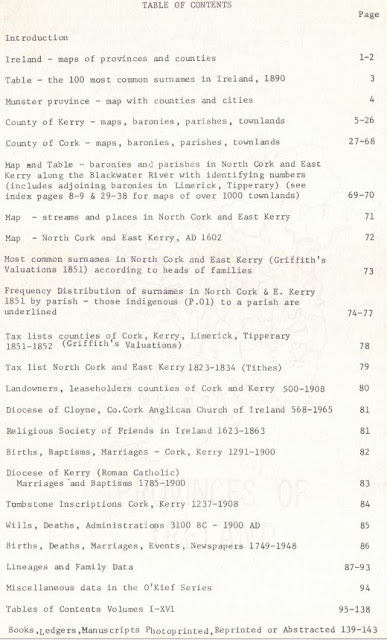The
O'Kief, Coshe Mang, Slieve Lougher and Upper Blackwater in Ireland collection by Albert E. Casey is made up of 16 large volumes containing a huge collection of Irish records covering parts of
County Cork and County Kerry. The Casey volumes were printed in the 1950s-1970s and are out of print now. They are in a few libraries around the world and show up on used booksellers sites from time to time.
The collection includes a separate index volume that can help narrow down which book contains the information for a topic and date range. I posted previously about
Finding Aids for the volumes, but one thing I haven't seen is a Table of Contents for the index volume itself.
The index isn't quite what you'd expect. While it contains a Table of Contents for each of the 16 volumes in the collection, it also has additional data. Following is the Table of Contents for the index volume.
TABLE OF CONTENTS
Introduction
Ireland - maps of provinces and counties - Pages 1-2
Table - the 100 most common surnames in Ireland, 1890 - Page 3
Munster province - map with counties and cities - Page 4
County of Kerry - maps, baronies, parishes, townlands - Pages 5-26
County of Cork - maps, baronies, parishes, townlands - Pages 27-68
Map and Table - baronies and parishes in North Cork and East
Kerry along the Blackwater River with identifying numbers
(includes adjoining baronies in Limerick, Tipperary) (see
index pages 8-9 & 29-38 for maps of over 1000 townlands) - Pages 69-70
Map - streams and places in North Cork and East Kerry - Page 71
Map - North Cork and East Kerry, AD 1602 - Page 72
Most common surnames in North Cork and East Kerry (Griffith's
Valuations 1851) according to heads of families - Page 73
Frequency Distribution of surnames in North Cork & E. Kerry
1851 by parish - those indigenous (P.01) to a parish are
underlined - Pages 74-77
Tax lists counties of Cork, Kerry, Limerick, Tipperary
1851-1852 (Griffith's Valuations) - Page 78
Tax list North Cork and East Kerry 1823-1834 (Tithes) - Page 79
Landowners, leaseholders counties of Cork and Kerry 500-1908 - Page 80
Diocese of Cloyne, Co.Cork Anglican Church of Ireland 568-1965 - Page 81
Religious Society of Friends in Ireland 1623-1863 - Page 81
Births, Baptisms, Marriages - Cork, Kerry 1291-1900 - Page 82
Diocese of Kerry (Roman Catholic)
Marriages and Baptisms 1785-1900 - Page 83
Tombstone Inscriptions Cork, Kerry 1237-1908 - Page 84
Wills, Deaths, Administrations 3100 BC - 1900 AD - Page 85
Births, Deaths, Marriages, Events, Newspapers 1749-1948 - Page 86
Lineages and Family Data - Page 87-93
Miscellaneous data in the O'Kief Series - Page 94
Tables of Contents Volumes I-XVI - Pages 95-138
Books,Ledgers,Manuscripts Photoprinted, Reprinted or Abstracted - Pages 139-143
The index starts off with some high level maps and a list of the 100 most common surnames in Ireland in 1890. My Creedon and Coakley surnames aren't common outside of County Cork, so not surprising that they didn't make the list. The top five surnames are Murphy, Kelly, Sullivan, Walsh, and Smith. I think I'm lucky mine aren't that common!
Pages 4-72 contain lists and maps of the baronies, parishes, and townlands in County Cork and County Kerry. Each parish is assigned a number which is used on the various maps where that townland appears.
Page 73 lists the top surnames in 1851 in the areas of County Cork and County Kerry covered by the volumes. This time Creedon made the list and is listed as an Irish surname with 90 families.
Pages 74-77 have tables showing the frequency of a surname in each parish in 1851. Those that Casey deemed indigenous to the parish are underlined. This is probably one of the more useful items outside of the Tables of Contents, since it gives a quick overview of the parishes where a surname is most common.
The last line in the example above shows that the Creedon surname had 29 families in
Clondrohid parish in 1851. The same numbering system used on the maps is used to identify
the parishes and Clondrohid was given number 13. Since the 29 is underlined, that
also means Casey identified Creedon as "indigenous" to the parish, but I'm not sure what Casey's guidelines were for that designation.
The next sections identify the Volume number and page ranges for various topics, including a fairly large list of lineages and family data. Finally, on pages 95-138, the actual Table of Contents for each Volume is listed.
The index ends with a couple of long, detailed "scientific" articles by Casey that aren't even mentioned in the Table of Contents. The first of these is called
Odyssey of the Irish Documented by Blood Group and Craniometric Analysis. I wonder what Casey would think of today's DNA analysis!
In future posts, I'll detail some of the individual sections in the index.
Amanuensis Monday is a daily blogging theme which encourages the
family historian to transcribe family letters, journals, audiotapes,
and other historical artifacts.




































